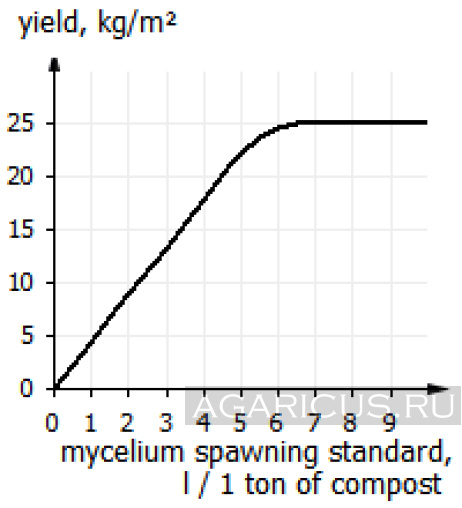The calculations amount of mycelium
Any mushroom mycelium is usually measured in liters or kilograms. One kilogram of mycelium usually takes up a volume of 1,6 liters, and conversely, 1 liter of mycelium weighs 0,6 kilograms. The calculations are performed in kilograms or in liters. It’s important not to use these two systems at one time to escape confusion in the calculations.
What is the spawning standard? The spawning standard is the amount of mycelium spawned per ton of compost. The common standard of spawning is 8-10 liters, or 5-6 kilograms of mycelium per ton of phase 2 compost. Why exactly that much, not more not less? In order to get an answer to this question, let’s think about the affect that the amount of mycelium per ton of compost has.
Graph 1. A diagram of dependence of yield on the spawning standard
First, it’s the mushroom yield. For example, if we don’t spawn the mycelium at all, we wouldn’t grow any mushrooms, this is confirmed by a case in practice, when mushroom growers, for unknown reasons, forgot to spawn the mycelium into the compost and waited for the crop with no result. On the other hand a question occurs of how much mycelium is needed per ton of compost, in order to obtain a maximal yield? As practice shows, much less than the recommended standard of spawning, about 5 liters per ton of compost. Further increase in the spawning standard practically doesn’t affect the yield. Nevertheless, we spawn 8-10 liters. What for?
The second factor that matters in the technological process and that depends on the spawning standard, is the spawn growth speed. Yes, when spawning a minor amount of mycelium in a ton of compost (solving the problem of nonuniform mycelium spreading on the compost), we can obtain a maximal yield. But mycelium growth will be much slower, and the slightest problems with sanitation and hygiene will allow the mushroom competitors to occupy the compost before mushroom mycelium.
This can lead to a total loss of yield. At the same time, when spawning a big amount of mycelium, it will grow more intensely and it will be hard to keep the compost temperature at specified ranges, which leads to mycelium death from extremely high temperature.
The recommended spawning standard is the practical result of many generations of mushrooms growers’ work. This amount of mycelium per ton of compost provides an opportunity to get a maximal mushroom yield and an optimal speed of mycelium growth in the compost.
What is the spawning standard? The spawning standard is the amount of mycelium spawned per ton of compost. The common standard of spawning is 8-10 liters, or 5-6 kilograms of mycelium per ton of phase 2 compost. Why exactly that much, not more not less? In order to get an answer to this question, let’s think about the affect that the amount of mycelium per ton of compost has.
Graph 1. A diagram of dependence of yield on the spawning standard
First, it’s the mushroom yield. For example, if we don’t spawn the mycelium at all, we wouldn’t grow any mushrooms, this is confirmed by a case in practice, when mushroom growers, for unknown reasons, forgot to spawn the mycelium into the compost and waited for the crop with no result. On the other hand a question occurs of how much mycelium is needed per ton of compost, in order to obtain a maximal yield? As practice shows, much less than the recommended standard of spawning, about 5 liters per ton of compost. Further increase in the spawning standard practically doesn’t affect the yield. Nevertheless, we spawn 8-10 liters. What for?
The second factor that matters in the technological process and that depends on the spawning standard, is the spawn growth speed. Yes, when spawning a minor amount of mycelium in a ton of compost (solving the problem of nonuniform mycelium spreading on the compost), we can obtain a maximal yield. But mycelium growth will be much slower, and the slightest problems with sanitation and hygiene will allow the mushroom competitors to occupy the compost before mushroom mycelium.
This can lead to a total loss of yield. At the same time, when spawning a big amount of mycelium, it will grow more intensely and it will be hard to keep the compost temperature at specified ranges, which leads to mycelium death from extremely high temperature.
The recommended spawning standard is the practical result of many generations of mushrooms growers’ work. This amount of mycelium per ton of compost provides an opportunity to get a maximal mushroom yield and an optimal speed of mycelium growth in the compost.


Lko:
Saheb hamare mushroom dry bable se pura form doob chuka hai ismein Ham Kya Karen Sahab Koi upay Ho to...
Production of Compost, Personal opinion (part 3). Wet...Abimbola Olaniyi-Balogun, Lagos Nigeria:
Hello there, I made mushroom compost using the long composting method. I used wet chicken manure, fresh...
Mushrooms in KazahstanZagreb, Croatia:
My name is Zlatko Vidmar.
Without chicken manure compost? Yes, it's possible...I am in modern mushroom growing over 40 years.
I see your farm and if...
nanyuki:
my email is samuelnjogo@gmail.com
Without chicken manure compost? Yes, it's possible...nanyuki:
i want to learn like a child on compost making for mushroom
Mushrooms in KazahstanVELLORE TAMILNADU INDIA:
SUITABLE JOBS – MUSHROOMS GROWER / COMPOST / SPAWN OR RELAVANT FIELDS
Without chicken manure compost? Yes, it's possible...Dear Hiring Manager...
Patna:
PLEASE SEND YOUR FORMULA without-chicken-manure-compost
watering first flush mushroomswasil, Malaysia:
i suggest you not to water on mush just maintain the good humidity if you not have any auto system for...
Compost Production. Personal opinion (Part 2)NARENDER SEHRAWAT, FARIDABAD NCR:
COMMON PROBLEM IN PHASE 1 BUNKAR IS THE UNBALANCED TEMERATURE, IT STARTS FROM 50-55 DEGREES TO 78-82...
Without chicken manure compost? Yes, it's possible...Hannes, Plettenberg Bay, South Africa:
Can you give me more details on compost without chicken manure for mushroom growing, what alternatives...